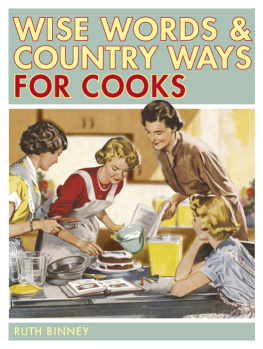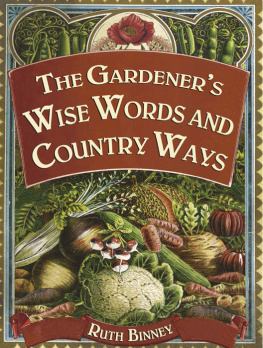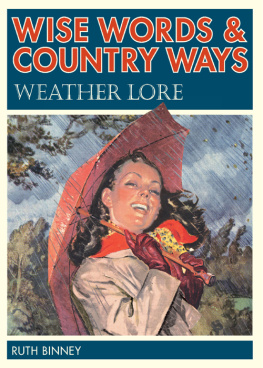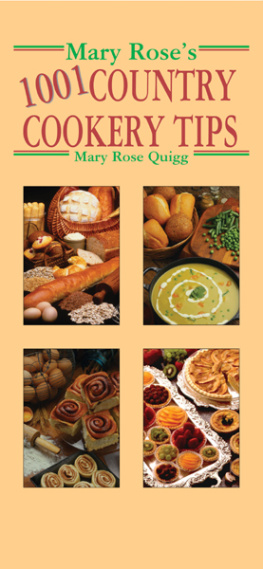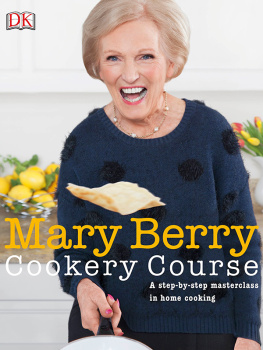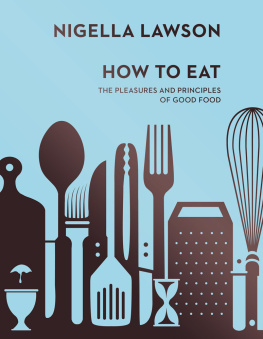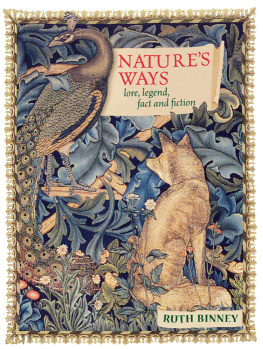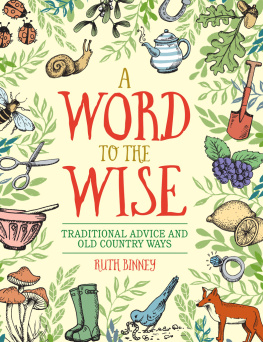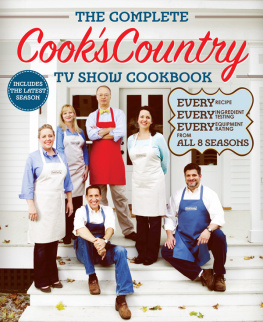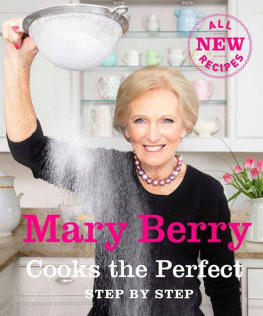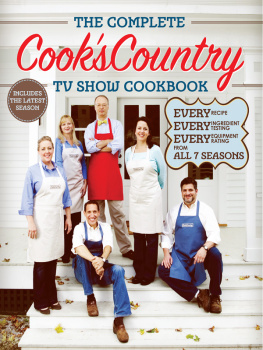INTRODUCTION
Cooking, wrote the great French gastronome Jean Anthelme Brillat-Savarin, is an art and adventure. My own experience has most certainly proved him right. I have also come to agree with the sentiments of the critic John Ruskin that cookery means the economy of your grandmothers and the science of the modern chemist; it means much testing and no wasting; it means English thoroughness and French art and Arabian hospitality; and, in fine, it means that you are to be perfectly and always ladies and loaf givers.
I learned the basics of cooking and kitchen thrift from my mother, and the art of baking from my aunt Ellen, who was supreme at pastry (especially Yorkshire curd tart) and bread. In the 1960s and early 70s I began experimenting with more ambitious recipes taken from magazines and set myself weekly challenges from the Cordon Bleu Cookery Course when it was published as a partwork. I love trying out new ingredients and combinations, but also find I return again and again to the essential principles of cooking that have been passed down by cooks through the ages, and to the old-fashioned comfort foods such as steak and kidney pudding, macaroni cheese and spotted dick, which remain firm favourites with friends and family.
Compared with their forebears, modern cooks have many advantages. Like others of my generation I have vivid childhood memories of putting meat outdoors in winter in the meat safe, with its fine mesh front, making cheese by suspending sour milk in a muslin bag and saving up post-war rations of sugar and dried fruit to make a Christmas cake. For the family a regular summer holiday task was skinning homegrown tomatoes for bottling, so that they would keep over the winter. And while I much enjoy making jam and chutney with the fruits and vegetables from our allotment, I am the first to advocate the advantages of the deep freeze, stainless steel knives that stay sharp with little attention and gadgets such as electric food processors and blenders, which cut down massively on the physical effort of tasks such as sieving and beating. Yet no cook, however well equipped their kitchen, can afford to ignore such facts as that a cake will sink if the oven door is opened before the batter is set, that an avocado exposed to the air will turn black, and that just a drop of yolk allowed to mix with egg whites will prevent them from being beaten into a stiff foam.
The wise words I have chosen to include in this book are those that chime with my own experiences. In exploring and expanding on them I have had the pleasure of delving into dozens of cookery and recipe books from the past, including the cookery book published to accompany the gas cooker my mother acquired when she married in 1939. As well as reflecting the culinary tastes of the times, these recipes, such as that for the apple charlotte I still make, reinforce the fact that good cooking never really changes. They have become an inspiration to go back to some of the old dishes.
Time and again I have found myself referring to the great cookery writers and compilers of the past, including Eliza Acton, Mrs Beeton and Fannie Merritt Farmer, the American cook who was the first to explain and demonstrate through her recipes the importance of accurate measurement for good results. I have also discovered many other gems, from Alexis Soyers Shilling Cookery for the People to Kettners Book of the Table by the Victorian journalist and critic E. S. Dallas, and The Modern Cook by Charles Elm Francatelli, a pupil of the great French chef Marie-Antoine Carme and matre dhotel and chief cook to Queen Victoria. Also useful have been Mrs A. B. Marshalls Cookery Book of 1897; the American cook Maria Parolas 1887 Kitchen Companion; Enquire Within, the classic late 19th-century Victorian household manual; and The Constance Spry Cookery Book by Constance Spry and Rosemary Hume, the first serious cookbook I possessed, which is still well used.
I am, as ever, indebted to my husband Donald, to my daughter Laura and her husband Lewis, and to the many friends who share our table. Thanks are also due to Neil Baber and the team at David & Charles, and to Beverley Jollands for her editorial expertise. This book has given me an unparalleled opportunity to look back to the ways and means of cooks past but also forward to a future in which good home cooking must always have a place.
Ruth Binney
West Stafford, Dorset, 2008
CHAPTER 1
THE PLEASURES OF THE KITCHEN
From stirring a risotto to the smell of toasting spices, and from the sizzle of a steak in the pan to the rhythmic chopping of fresh vegetables, the pleasures of the kitchen take many forms. Above all, the delights of the kitchen are the means of sharing tasty, well-cooked food, created from the best of ingredients, with family and friends. Alexis Soyer, one of the most famous chefs of the mid-19th century, bemoaning the demise of home cooking in a manner reminiscent of todays ready meal culture, concluded that a dinner is the creation of a day and the success of a moment. Therefore you will perceive that nothing more disposes the heart to amicable feeling and friendly transactions than a dinner well conceived and artistically prepared.
To be a good cook it is not necessary to have a kitchen bristling with equipment, although good knives and pans are essential, and such gadgets as electric mixers, food processors and blenders take much drudgery out of food preparation. What is vital, however, is to have a love of food, a knowledge of ingredients and the way they behave and a flair for matching flavours, tastes and textures, so that every dish is a delight to the palate. Compared with the modest range of ingredients available to cooks of previous generations, we are blessed with a vast range of foods from every continent, available in every season of the year. Yet one of the great pleasures of the kitchen is still cooking local foods, and especially those you have grown yourself, and serving them with art and style.
THE STOVE IS THE COOKS MOST IMPORTANT INSTRUMENT
Because without it nothing can be cooked. Compared with the stoves and ranges of the past, the heat of modern gas and electric stoves, and even modern ranges, is easy to regulate, making it possible to cook with much greater precision and guarantee consistent results.
The necessity of the stove for cooking was emphasized in books such as A Plain Cookery for the Working Classes by Charles Elm Francatelli, first published in 1852. A little sum of money, he said, should be spent on a cooking stove with an oven at the side, or placed under the grate, which should be so planned as to admit of the fire being open or closed at will; by this contrivance much heat and fuel are economized.
The stove Francatelli describes, with an insulated enclosed grate, is a type of range based on an invention by Count Rumford (born Benjamin Thompson) in 1798, though it would still have been greedy of fuel. Rumfords device, originally used by the German army, consisted of a sheet metal oven set into bricks with small fires underneath each of the hobs on the stovetop and wells sunk into the hotplate to hold pots and pans.
Given the work involved in cleaning out the kitchen range every day, and blacking the outside regularly, the arrival of gas and electric cookers was a boon. Gas cookers, which had been invented in 1802 by a Moravian scientist Zachus Winzler, were slow to catch on, partly because many gas companies, who were supplying gas for lighting, prohibited its use during the day. The stoves became more popular after various models were demonstrated at the Great Exhibition in 1851, and gas cooking became more accurate after the introduction of the thermostat or Regulo in 1923.

